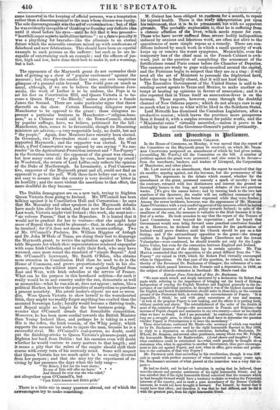The opponents of the Maynooth grant do not surrender their
task of getting up a show of " popular excitement" against the measure ; but, through the smoke they raise, one sees suspicious glimpses of a gene.ral calm beyond. The world goes on much as usual, although, if we are to believe the multitudinous Jere- the work of Luther is to be undone, the Pope is to se% his foot on Constitution Hill, and Queen Victoria is to be- come a Queen Mary. " the Bloody," unless she prove a female James the Second. There are some particular signs that throw discredit on the show. Certain Dissenting delegates report Manchester to be opposed to the grant : those delegates re- present a particular business in Manchester—" religion-bum- mess," as a Chinese would call it : the Town-Council, elected by popular suffrage, have, we believe, petitioned for the bill : Manchester, then, seems to be favourable, though its Dissenting ministers are adverse,—a very respectable body, no doubt, but not " the people." Again, four Members have recently been elected. In Greenock, two Free-traders stood : one opposed, the other supported Maynooth ; and the supporter was elected. In West Bent, a Peel Conservative was opposed by one crying " No sur- render "in the Agricultural-Protection interest and " No-Popery" in the Sectarian interest : the opponent of the grant was chosen ; but how many votes did he gain by corn, how many by creed? In Woodstock, the return of Lord Loftus only reflects the opinion of the Duke of Marlborough. In Leominster, a Peel Conserva- tive, supporter of the Maynooth grant and all, could not find an opponent to go to the poll. With these facts before our eyes, it is not easy to assume that the country is very decided or bitter in its hostility and the more violent the assertions to that effect, the more doubtful do they become.
The Dublin demagogues are on a new tack, trying to frighten Queen Victoria from going to Ireland. Mr.'U'Connell has been talking against it in Conciliation Hall and Corporation : he says that Mr. Macaulay and other speakers in the Maynooth debates have made him alter his mind, and that now he does not wish it. Last week, Victoria might visit Ireland ; this week, she must not- " sic volvere Parcas ' that is the Repealers. It is hinted that it would not be prudent for her to venture—that she might hear more of Repeal than would be pleasant—that, in short, she might be insulted; for if it does not mean that, it means nothing. Two of Mr. O'Connell's Prelates, Dr. William Higgins of Ardagh and Dr. John M'Hale of Them, are doing their best to disparage the Maynooth grant, to revive the agitation against the Chari- table Bequests Act which their representations rendered unpopular with some Irish Catholics, and to rally their flock, who may have wavered, once more round the standard of "simple Repeal." And Mr. O'Connell's lieutenant? Mr. Smith O'Brien, who obtains more attention in Conciliation Hall than he used to do in the House of Commons, and grows proportionately rash in his elo- quence, renews the wildest hints at war against England from East and West, with Irish subsidies at the service of France. What can be his purpose in this barefaced sedition—for such it really would be in any country under the sun, democratic as well as monarchic—what he Can aim at, does not appear ; unless, like a political Hocker, he braves the penalties of martyrdom to purchase a present notoriety. His astute leader's objects are not so recon dite. Were Queen Victoria to show herself to the warmhearted Irish, they might too'readily forget anything less exalted than the anointed Sovereign Lady; loyalty would become a thriving trade, and Repeal might no longer be the best business going. No Wonder that O'Connell dreads that formidable competition. Moreover, he has been more cordial towards the British Minister than Young Ireland likes, and perhaps he is taking in a reef. His is the reflex, the Irish version, of the Whig policy, which supports the measure but seeks to injure the man, because he is a successful rival. Mr. O'Connell's coal-porters, no doubt, could put the finishing-stroke to Queen Victoria's pleasure-jaunt, and frighten her back from Dublin : but his enemies even will doubt whether he would venture to carry matters to that length ; and it seems a pity that the rulers of the empire should shift their course with every turn of his unsteady mind. Some will suspect that Queen Victoria has too much spirit to be so easily diverted from her purpose ; and that she may try the experiment of re- viving by her presence the days when the lady sang—
Sir Robert, I feel not the least alarm; No son of Erin will offer me harm.' • • * And blessed for ever was she who relied,"
riot altogether upon O'Connell's, but
" Upon Erin's honour and Erin's pride."


























 Previous page
Previous page